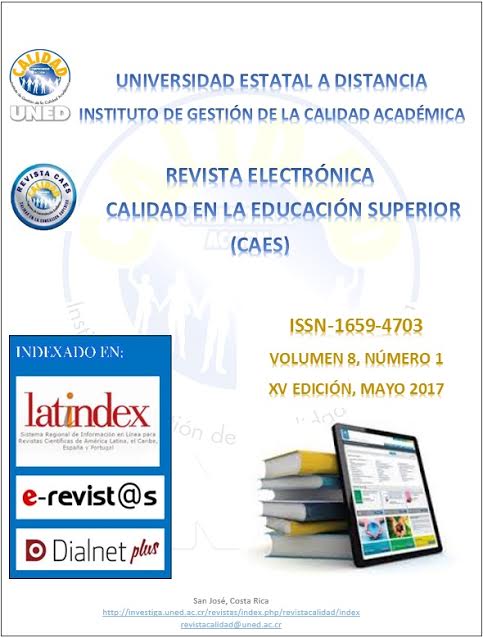EXPERIENCIA DEL USO DEL E-BOOK COMO RECURSO DIDÁCTICO EN LA ORGANIZACIÓN Y DISEÑO EN LÍNEA DE LA ASIGNATURA MERCADEO II
DOI:
https://doi.org/10.22458/caes.v8i1.1788Resumen
Esta investigación pretende analizar la experiencia de aprendizaje de los estudiantes respecto al uso del e-book como recurso didáctico para la asignatura Mercadeo II. Paralelo a ello, se estudia el grado de satisfacción tanto de la unidad didáctica digital como de la organización y diseño de esta asignatura en línea. Esto mediante una investigación descriptiva que utiliza encuestas aplicadas a los estudiantes matriculados durante el segundo cuatrimestre del 2015 y entrevistas directas a personal especializado de la UNED. Con ello, se llega a conclusiones importantes como la resistencia al cambio ante el uso del e-book, y que ello responde a dificultades que tienen un origen cultural que no permiten la adaptación de este recurso como material de estudio. Sin embargo, se indican factores positivos como la hipertextualidad y posibilidades de accesibilidad en diferentes dispositivos móviles, facilitando la lectura en cualquier momento y lugar. Se valoraron los aspectos del entorno virtual respecto al diseño y organización de esta asignatura, y los estudiantes consideraron que las actividades realizadas, favorecieron el análisis y apoyan el aprendizaje significativo.
EXPERIENCE OF USING THE E-BOOK AS A TEACHING RESOURCE IN THE ORGANIZATION AND DESIGN ONLINE MARKETING II COURSE
Abstract
This research aims to analyze the learning experience of the students regarding the use of e-book as a teaching resource for Marketing II course. Parallel to this, the degree of satisfaction of both the digital teaching unit and the organization and design of this online course is studied. This is a descriptive research using surveys of students enrolled during the second quarter of 2015 and direct qualified personnel at UNED interviews. With this, you will reach important conclusions as resistance to change to use this e-book and respond to difficulties that have a cultural origin and preventing the adaptation of this resource as study material. However, positive factors such as hypertext possibilities and accessibility on various mobile devices easier to read at any time and place indicated. Aspects of the virtual environment on the design and organization of this course is assessed and students felt that activities favored analysis and support meaningful learning.
Keywords: Virtual learning, distance education, e-book, didactic resource, distance university.
Citas
Feijóo, C. (2013). Soportes digitales y transformación de las industrias de contenidos. (Spanish). El Profesional De La Información, 22(1), 5-9. DOI: 10.3145/epi.2013.ene.01. Recuperado de: http://search.ebscohost.com/login.aspx?direct=true&db=lih&AN=92774921&lang=es&site=ehost-live
García-Delgado Jiménez, B., & Arias Rubio, G. (2014). Papel vs. digital: hábitos de lectura de los estudiantes de la UEM. (Spanish). Caracteres: Estudios Culturales y Críticos De La Esfera Digital, 3(1), 250-271. Recuperado de: http://search.ebscohost.com/login.aspx?direct=true&db=fua&AN=96513507&lang=es&site=ehost-live
Gilbert, R. J. (2015). E-books: A Tale of Digital Disruption. Journal of Economic Perspectives, 29(3), 165-184. DOI:10.1257/jep.29.3.165. Recuperado de: http://search.ebscohost.com/login.aspx?direct=true&db=bth&AN=108621564&lang=es&site=ehost-live
Larson, L. (2015). The Learning Potential of E-Books. Educational Leadership, 72(8), 42-46. Recuperado de: http://search.ebscohost.com/login.aspx?direct=true&db=a9h&AN=102940887&lang=es&site=ehost-live
Maughan, S. (2015). Going digital: how schools buy and use e-books. Publishers Weekly, 262(35), 18-33. Recuperado de: http://search.ebscohost.com/login.aspx?direct=true&db=bth&AN=109226404&lang=es&site=ehost-live
Milosavljević, K. y Derić, I. (2014). E- book and internet usage in the teaching process. Singidunum. Journal of Applied Sciences, 488-492. DOI:10.15308/SInteZa-2014-488-492. Recuperado de: http://search.ebscohost.com/login.aspx?direct=true&db=bth&AN=101294579&lang=es&site=ehost-live
Rane, M. Y. (2015). E-Books: A New Trend of Collection in Academic Library. International Journal of Multidisciplinary Approach & Studies, 2(2), 106-114. Recuperado de: http://search.ebscohost.com/login.aspx?direct=true&db=a9h&AN=103413501&lang=es&site=ehost-live
Yalman, M. (2015). Education faculty students' views about use of e-books. Turkish Online Journal of Distance Education (TOJDE), 16(1), 145-161. Recuperado de: http://search.ebscohost.com/login.aspx?direct=true&db=eue&AN=101080557&lang=es&site=ehost-live/
Descargas
Publicado
Cómo citar
Número
Sección
Licencia
Esta revista provee acceso libre inmediato a su contenido bajo el principio de que hacer disponible gratuitamente la investigación al publico, lo cual fomenta un mayor intercambio de conocimiento global.
